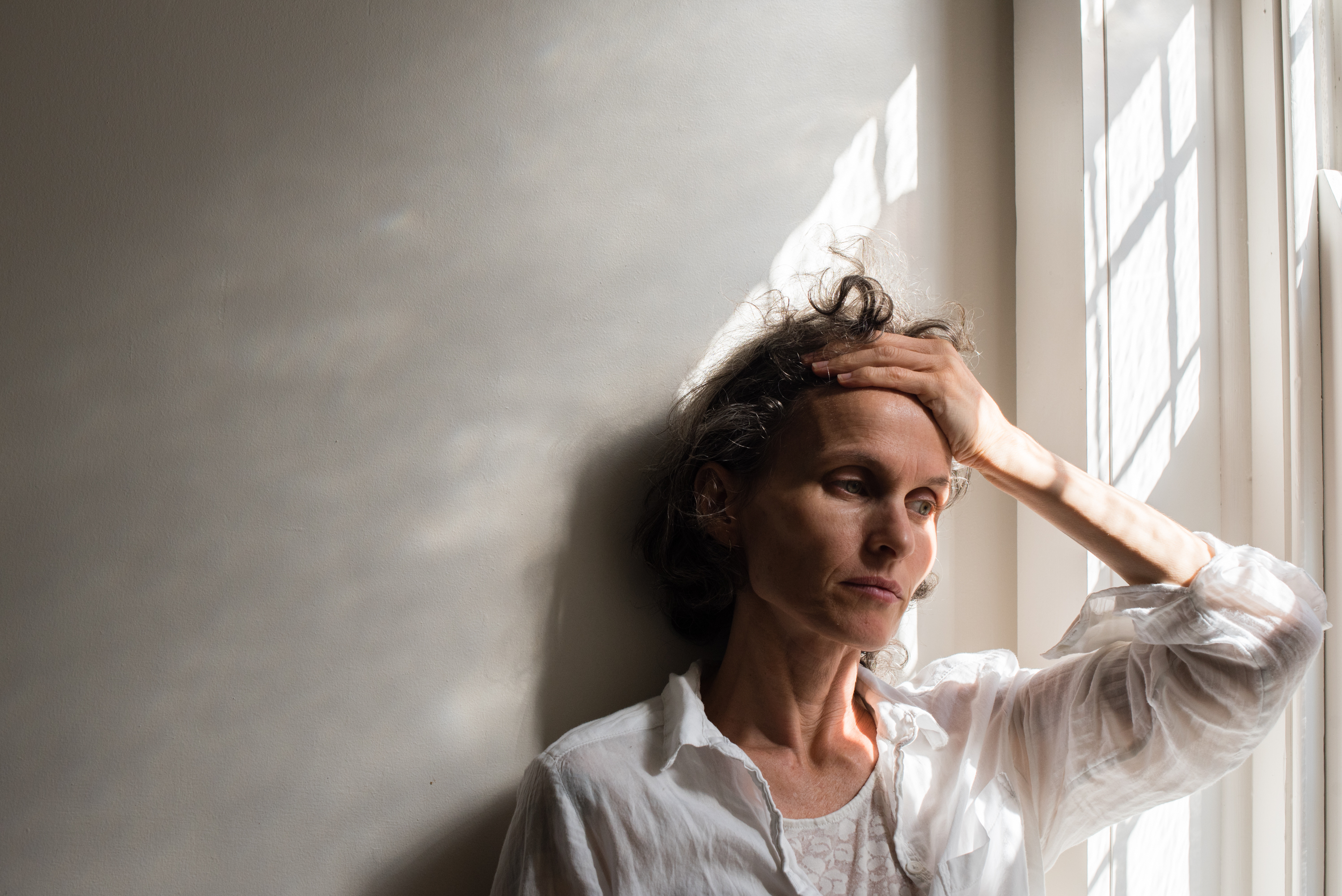
Celebrity news, beauty, fashion advice, and fascinating features, delivered straight to your inbox!
You are now subscribed
Your newsletter sign-up was successful
According to research from the Fawcett Society and Channel 4, one in 10 women have left work because of menopause symptoms – so it’s fair to say that change is needed urgently to make sure women are getting the right support.
The report, ‘Menopause and the Workplace’, published in April 2022, polled 4,000 women aged 45-55 – 44% of which said their ability to work had been affected by the menopause, while 61% said that they had lost motivation at work due to their symptoms and 14% of women reduced their hours at work.
While menopause is completely natural and normal – and women shouldn’t feel ashamed of doing whatever is necessary to alleviate their symptoms at work – many workplaces don’t know, or understand, what might be the cause of their female coworkers’ unusual lateness, forgetfulness or inability to concentrate.
Tracey* had worked hard as a social worker for over eighteen years. Her record was unblemished – she’d had only a handful of sick days and had always been an exemplary employee.
But then, as she turned 50, her menopause symptoms hit.
Besides the hot flushes and brain fog, she was crippled with paralysing anxiety, heart palpitations that lasted for hours, and debilitating fatigue, too. On one occasion, she collapsed at work as a result of her symptoms and came too on the floor with her head bleeding.
Rather than offering her the support she clearly needed, Tracey’s bosses fired her. “There was no sympathy or understanding,” she explains.
Celebrity news, beauty, fashion advice, and fascinating features, delivered straight to your inbox!
Menopause and job loss
Sadly, Tracey is far from alone, and the number of women being unfairly dismissed because of their menopausal symptoms seems to be on the rise.
Earlier this year, Koru Kids and Anna Whitehouse campaigned to #StopThePause and call time on women leaving the workplace needlessly because of debilitating menopausal symptoms.
The support at current is simply not good enough, and more must be done to ensure women, menopausal or not, aren’t discriminated against because of a perfectly natural health phenomenon all women experience.
According to an analysis of court records by Menopause Experts Group in its annual The Trial Of Menopause Report, the number of employment tribunals involving menopause has nearly doubled in a year.
There were 23 employment tribunals referencing menopause in 2021, compared to 16 in 2020 – a 44% year-on-year increase.
So are women being unfairly and disproportionately affected in later life as a result of their menopause symptoms? And is it impacting their career paths?
Short answer: yes.
Why are the number of menopause tribunals on the rise?
What do you reckon happens when said symptoms – most notably hot flushes, low mood, night sweats and brain fog – affect your day-to-day life so much you can’t work? And why are the numbers of tribunals involving menopause on the rise?
According to Dee Murray, CEO and founder of Menopause Experts Group, it’s because women are being actively encouraged to speak their minds and empowered to voice their concerns.
“There has been a dramatic increase in awareness of women’s issues in recent years since the #MeToo campaign,” she explains. “Celebrities like Ulrika Jonsson, Andrea McLean and Davina McCall have come forward to talk candidly about their experience of menopause, and women want and expect more from life.”

What is the current UK law around menopause and job dismissal?
In short, any form of discrimination falls under the Equality Act of 2010. “This makes it illegal to discriminate against people based on their sex or disability,” explains Murray.
Sadly, she points out that despite the law, many workplace policies are lagging behind when it comes to menopause. “Current campaigners are calling for women with menopausal symptoms to get similar protection to pregnant women,” she continues.
Research released by the Women and Equalities Committee, which polled 2,161 women all experiencing at least one symptom of the menopause, found that 31 per cent had missed work because of their symptoms. And despite the vast majority reporting some impact on how they felt at work, only 11 per cent asked for workplace adjustments – with 26% of those who did not request adjustments claiming they were “worried about the reaction of others”.
These findings are part of the Women and Equalities Committee’s ongoing inquiry into menopause in the workplace. Their latest report, which was published in July 2022, stated that employers’ failure to offer support for women experiencing menopause was forcing “highly skilled and experienced” workers out of the labour market, and the country was “haemorrhaging talent” as a result.
Does this put women at a disadvantage to men?
The symptoms of menopause themselves put women at a huge disadvantage to men, reckons Murray. All women experience menopause differently. Symptoms can be physical, such as hot flushes, headaches, poor sleep and erratic periods, or psychological, such as anxiety, low mood, lack of confidence and poor concentration.
“For many women, they can be debilitating,” she explains. “In most workplaces, ignorance of both the menopause and perimenopause symptoms means there is little sympathy or empathy for what women are going through, making work challenging.”

My menopause symptoms are affecting my ability to work. What do I do?
1. Don't be scared
Firstly, Murray wants you to hear this: don't be frightened. "Our bodies are incredible, and if you give them all they need, you're winning half of the battle already."
This includes:
- Good sleep
- Relaxation
- Exercise
- Stress relief
- A well-balanced diet.
These won’t get rid of your menopause symptoms, but they can sure help with making sure what you experience isn’t as severe.
2. Read up
Educating yourself about your own biology is one of the easiest ways to protect yourself, shares Murray, as if you’re clued up and waiting for something to happen, it doesn’t come as such a surprise. “By and large, it comes down to knowledge and being well-equipped for what’s coming,” she says.
FYI, she further highlights that often, women find the emotional or psychological symptoms of menopause the most challenging. Arming yourself with the relevant stats and information may help ease this stress.
3. Be prepared
As with anything in life, preparation is key. “We all go through the menopause – there is no escaping it, so it’s important to learn more about it and your body,” Murray shares.
Sites like the Menopause Expert Group are well equipped to help inform you.

"I was fired because of my menopause symptoms: sadly, it's more common than you think."
Tracey* was a social worker for more than 18 years and had an unblemished record before menopausal symptoms hit her hard. Read her story here.
“In 2018, I was fired from my job as a social worker. I was suffering perimenopausal symptoms that were disabling, but my bosses decided that wasn’t a good enough excuse.”
“I had informed my manager the year before that I was struggling. No one told me that the menopause wasn’t just hot flushes and brain fog. I was suffering paralysing anxiety. I ached, had palpitations that lasted hours and felt enormous fatigue.”
“I couldn’t eat. I lost two stone in weight. When I went to the doctor, they prescribed antidepressants, which made things worse. I even saw a heart specialist – but no one mentioned the menopause.”
“My boss said to take the time I needed, but soon after, put me on a performance improvement plan. It was another set of hoops for me to jump through. There was no sympathy and no understanding.”
“I told my boss on numerous occasions that I wasn’t coping and that disciplinary procedures were making my symptoms worse. My manager knew of my vulnerability and, in my opinion, used it to his advantage. My employers did know about the menopause but chose to ignore it, placing me under more pressure, which exacerbated my symptoms.”
“It had been going on for about a year before I realised, through doing my own research, that this was the menopause. It was such a relief: I had thought I was going mad.”
“During that time, I kept having these disciplinary meetings at work and during one of these meetings, completely out of the blue, they announced I was fired.”
“I was in total shock. I felt like a criminal. I walked straight out of the meeting and went to bed. I couldn’t get up for weeks.”
“Then I began to get angry. I just felt it was so unjust, how I’d been treated. I was being punished for having problems around a woman’s transition. I also thought there were lots of implications for other women going through the same thing.”
“I decided to take them to a tribunal. I paid £12,000 for a barrister but I didn’t stand a chance. The tribunal judge, a man in his 60s, completely dismissed all mention of the menopause. He didn’t understand the menopause, and it was inappropriate for him to decide over a medical matter as he is not a doctor.”
“My bosses didn’t turn up to the hearing and so their claims couldn’t be challenged. The judge just saw that I was behind in my work and backed my bosses, corroborating their behaviour. Now they have carte blanche to carry on the same way with other women in the same position. I’m left feeling like I’ve been punished twice.”
“I don’t know what I’m going to do now. I’m on yet another version of HRT – my fifth type – and it’s finally working well. If I’d felt this well while I was employed, I’d never have let them get away with what they did.”
“There needs to be more understanding and a more inclusive approach towards women in the workplace.”
In partnership with Vichy. Marie Claire created this content as part of a paid partnership with Vichy. The contents of this article are entirely independent and solely reflect the editorial opinion of Marie Claire.

Ally is Marie Claire UK's Senior Health and Sustainability Editor, a well-regarded wellness expert, ten-time marathoner, and Boston Qualifying runner.
Utilising her impressive skillset and exceptional quality of writing, she pens investigative, review and first-person pieces that consistently demonstrate flair and originality.
As well as writing, Ally manages a team of freelancers, oversees all commissioning and strategy for her pillars, and spearheads the brand's annual Women in Sport covers, interviewing and shooting the likes of Mary Earps, Millie Bright, and Ilona Maher. Shortlisted for three BSMEs and winning one in 2022, Ally lives and breathes her verticals: her eye for a story and connections within the wellness sphere are unrivalled. Follow Ally on Instagram for more.
